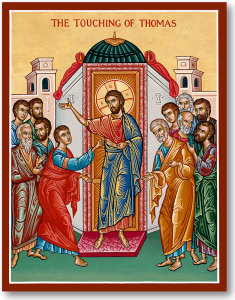Sunday of the Holy Apostle Thomas – Metropolitan of Strumica Nahum
The higher the goal a person usually sets for himself, the more he achieves. Thus, the Lord calls us to accomplish the highest goal: “You shall be perfect, just as your Father in heaven is perfect” (Matthew 5, 48). This means, we should not be satisfied only with our faith in God, but we should also strive for the knowledge of God – so that, from the experience of communion with Him, we may know Him.
The desire of the Apostle Thomas to touch the wounds of the resurrected God-Man Jesus Christ is not an unbelief, but a natural and saving yearning of every man to know God by experience, and not just by simple belief and by reading books. Because, in particular, the intellectual knowledge of God itself does not bring us definite salvation, but most often brings us pride, divisions and downfall, while the knowledge of the mind (intellect, nous) that arises from the experience of communion with God brings us humility and unity, in the Holy Eucharist of The Church.
The Apostle Thomas bore witness of Christ through martyrdom. The Holy Gospel is not written to examine the faith of the holy Apostle Thomas – that is not in our dominion, but to examine and test our own faith through his example, and to repent – which is in our dominion.
Therefore, the words of Christ: “Do not be unbelieving, but believing!” (John 20:27), should be compared with the difference between ascetic faith and faith full of grace – in which the Lord calls us all. Ascetic faith consists in forcing ourselves to believe in God (“I believe, Lord, help my unbelief!” – Mark 9:24), and the faith full of grace is when from experience of communion with Him we have knowledge and familiarity of Him. (“My Lord and my God!” – John 20:28).
That is why, the statement: “Thomas, because you have seen Me, you have believed; Blessed are those who have not seen and yet have believed” (John 20:29), it simply means that those who have not seen God through experience, and who, nevertheless, remain faithful to the end, will be saved – and therefore they are blessed, and that the Apostle Thomas is holy.
The experience we are constantly talking about here, and which we describe as the spiritual knowledge of the mind (nous) that arises from the experience of the communion with God in our hearts, is the experience of the prayer of the mind in the heart. Without this experience there is no faith full of grace, nor enlightenment of the mind, and nor continuous transfiguration of man into deification. The foundation of this experience, without which it is not possible, is the harmonization of the way of our life with the level of the spiritual development we are at.
The fundamental longing of every Christian soul should be the attainment of the gift of the prayer of the mind in the heart and the knowledge of God from experience. In this, there is no difference between laymen and monks, between priests and parishioners. Without this longing, confirmed by deeds, there is no Orthodox spiritual life.
That is why Saint Nikephoros Hesychast, together with many Holy Fathers of the Church, in the context of complete personal repentance, as well as mercy and kindness towards the ones that suffer, insists on this toil, saying:
“Brethren, even after much effort you fail to enter the realm of the heart, as I have told you – do this, as I will furthermore tell you, and with God’s help you will find that which you are searching for. You know that every man’s inner word is in their chest [heart]. Because, inside the chest, when our lips are silent, we talk to ourselves and say a prayer, and sing psalms or say something else. So, with the inner word, expelling from the heart every thought (because you can, if you want), say the short prayer ‘Lord Jesus Christ, Son of God, have mercy on me!’ – and force yourself to focus – instead of any other thought, only this one to always cry within your inner-self.
“If you continue to take this action relentlessly and with all your attention, in time, through this, the entrance into the heart will be open to you, which I have written to you about, without any doubt, as we ourselves become acquainted with it, through experience.”
Most-Holy Theotokos, save us!
Metropolitan of Strumica Nahum
(08.05.2021 15:58

